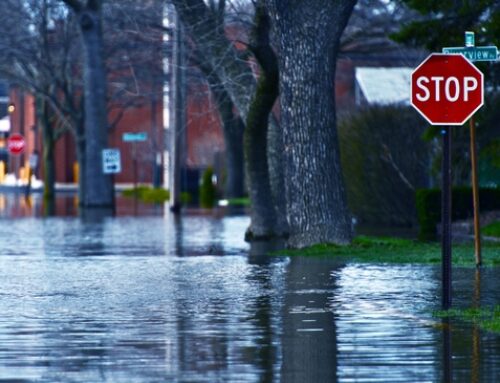Last week, FEMA started mailing Clear Communications letters out to policyholders with new business effective April 1, 2016 or later and renewal effective dates of October 1, 2016 or later. These letters are designed to inform the policyholder of their current flood risk and will include messaging specific to their policy rating.
Policyholders will receive the letters as notification that a review of their property’s flood risk has been done. There will be an explanation of what was found and how the flood risk will impact what they pay for flood insurance. For some, having an Elevation Certificate (EC) may lead to lower flood insurance costs immediately or in the future.
Here’s an example of the letter’s that was sent out:

How Can I Pay Less For My Flood Insurance?
What you pay for flood insurance has a lot to do with how much flood risk is associated with your building. It makes sense to reduce flood risk no matter what, but in some instances reducing flood risk can also lead to lower flood insurance costs. Below are some resources to help, but discussing your policy options with your insurance agent may also be helpful.
Reducing Flood Risk to Residential Buildings that Cannot be Elevated explains things that can be done to better protect a building from flood damage, and in some cases implementing these changes will reduce the cost of your flood insurance.
Communities enrolled in the NFIP’s Community Rating System can get discounts on their flood insurance, learn more here.
The Homeowner’s Guide to Retrofitting can help you decide the right method to mitigate future damage and loss by considering various factors, such as hazards to your home, permit requirements, technical limitations, and costs. This guide also helps you develop a flood protection strategy.
The Increased Cost of Compliance* (ICC) coverage, for eligible properties that are required to be in compliance with local floodplain requirements, can help pay for elevating a building after a flood. Another way to get help with the cost of elevating your building would be through one of FEMA’s various grant programs. The grants are administered by states, and each state decides which projects it will fund and for how much. Contact your local floodplain manager for more information.
To learn more about elevating your property, read Elevating Your House.
Did you know? An elevated home, like the one shown on the 5 Ways to Lower Your Flood Insurance Premium, with a first floor elevated 3 feet above the base flood elevation, can expect to save 60% or more on annual flood insurance premiums.
Did you know? Elevating just one foot above the BFE often results in a 30% reduction in annual premiums.
Why Does My Mortgage Lender Require Me To Buy Flood Insurance?
The Flood Disaster Protection Act of 1973, as amended by the National Flood Insurance Reform Act of 1994, requires federally-regulated or insured lenders to mandate the purchase of flood insurance as a condition of any loan on a property located in a high-risk flood area also known as a (Special Flood Hazard Area). The insurance must be maintained during the term of the loan the building is in a high-risk flood area and at minimum, must cover the lowest of:
- The outstanding principle balance of the loan;
- The maximum amount of coverage available under the NFIP for that particular type of building; or
- The full insurable value of the building and/its contents
However, some lenders reserve the right in their loan documents to require the amount of flood insurance being purchased to exceed the minimum amount required under federal law. Property owners with questions about the requirement to purchase flood insurance or the amount of flood insurance being required should talk to their lender.
For properties not located in a high-risk area, but instead in a moderate- to low-risk area, flood insurance is not required, but it is recommended. In fact, over 20-percent of all flood insurance claims come from areas outside of mapped high-risk flood zones.
Note: If during the life of the loan the maps are revised and the property is now in the high-risk area, your lender will notify you that you must purchase flood insurance.
Everyone lives in a flood zone. If you don’t already have a flood insurance policy protecting your property talk to your agent, or find an agent today. Together, you can discuss how best to meet your insurance needs. There are policies for homeowners, business owners and renters.
If you received a letter like this; or similar; and have questions regarding your flood insurance coverage, contact us at Anderson & Associates. We’ll take time and answer any questions that you may have about any upcoming changes to your coverage.









